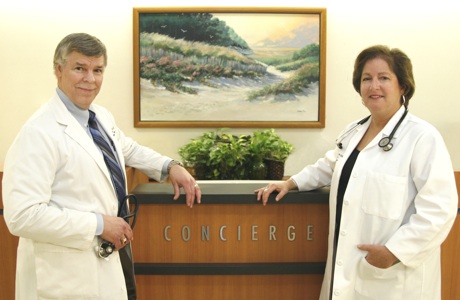

The Virginia Beach Premier Medical NewsletterNovember, 2011
VBPM Connection is a newsletter published by Virginia Beach Premier Medical, an internal medicine practice dedicated to personalized, highly attentive, high quality care for our patients. The newsletter provides information of a general nature about our office, current health news and various common illnesses and ailments. None of the information provided is meant to be specific for any particular individual. Always seek the advice of your personal physician for any specific information about your health.
Seasonal Respiratory Illnesses
This is the time of year when a lot of people begin coming down with respiratory illnesses of various kinds. Here are a few to look out for…
Allergic rhinitis is very common this time of year with sinus congestion, drainage, post-nasal drip, which is usually clear. This is unlikely to cause fever or severe sinus congestion. Sinusitis is an infection of the sinuses with discolored or even bloody drainage, sometimes with fever, chills and severe headache. This is usually viral, but can be bacterial and may require an antibiotic. Laryngitis is a viral infection of the larynx where the vocal cords are. Antibiotics usually don’t work for this because it is almost always viral. Acute bronchitis is a respiratory infection that involves the bronchial tubes below the trachea (windpipe). This is associated with a deep cough and dark phlegm and can be either viral or bacterial. We often do use antibiotics for this. Pneumonia is a lower respiratory infection when the organisms get down into the air-sacs deep in the lung. It can be viral or bacterial, but we almost always use antibiotics for this. We can usually diagnose this by physical exam but not always. If we suspect it, we usually get a chest x-ray for verification. If the illness is severe, it may require hospitalization. We have certain criteria that we use to determine this. Asthma is a condition of bronchial spasm with wheezing and coughing that can be worsened by infection or allergies in certain susceptible individuals. It may be acute and temporary or chronic in some people. We have to use bronchodilator medicines and sometimes steroids and antibiotics to help improve this.
Gastroenteritis
This is a syndrome of abdominal symptoms that may include nausea, vomiting, diarrhea or pain. It is usually caused by a virus, but could be food poisoning or bacterial infection. It may begin as an upper respiratory infection and then develop into an intestinal infection. Depending on the cause, it may last for 1 to 7 days – Sometimes even longer in the case of the Norwalk virus. Most people can get through this by taking a light diet or even by going on a liquid diet to let the bowel rest. Antibiotics usually don't help and may make things worse. It’s best not to use anti-diarrhea medicine because that prevents the body from getting rid of toxins. If dehydration develops, hospitalization may be required.
How Long to Continue Fosamax?
The controversy continues about how long to continue Fosamax and other similar medications used for osteoporosis. This would include Actonel, Boniva and the intravenous Reclast as well.
Studies show that taking any of these drugs for longer than five years can be associated with an increase in adverse effects like jaw necrosis and femur fractures. Furthermore, it seems that taking any of them for five years (even less for Reclast) and then stopping provides about the same amount of benefit as taking them for 10 years. So there’s really no advantage to taking them any longer than that unless the risk of bone loss is very high. The bone density should be rechecked 2-3 years later after stopping the drug, and if there is bone loss, consider restarting it then, or starting one of the other agents for osteoporosis, like calcitonin, raloxifene, Forteo or Prolia.
Neuropathic Pain
A new extended release form of gabapentin is now available for the treatment of neuropathic pain, like diabetic neuropathy and post-herpetic neuralgia (chronic pain that occurs after having had shingles). This is called Gralise which costs about $180/month as compared to $240/mo for Lyrica (a similar drug), or $40/mo for regular gabapentin.
This follows on the heels of another form of slow release gabapentin, called Horizant, recently approved for restless leg syndrome.
These are both considered second line therapies however. Tricylclic anti-depressants are still considered first line agents for neuropathic pain.
Sometimes, we use combinations of drugs like amitriptyline AND gabapentin for relief of this severe pain. The combination will often work better than either drug alone.
Cymbalta, opioids, lidocaine patches and capsaicin creams are also used for this condition.
PPI Drugs and Low Magnesium
PPI drugs, like Prilosec and Nexium are very beneficial for acid reflux, and for treatment and prevention of ulcers.
There are some potential adverse effects, however, like headaches, diarrhea, and gastroenteritis. One effect that can happen is that they may reduce the absorption of Magnesium and cause a deficiency of this important chemical.
Low Magnesium levels may cause muscle weakness, fatigue, tremors, loss of appetite and even heart arrhythmias. If you’ve been on a PPI for a long time – 6-12 months – you may want to ask your doctor to check a magnesium level. If it is low, it can be easily replaced by taking a magnesium supplement, like Slow-Mag or Mag-Tab SR. Mag-Ox is another one but it’s more likely to cause diarrhea.
Peripheral Arterial Disease
This is a condition usually caused by atherosclerosis, or buildup of cholesterol on the insides of arteries. The result is a decrease in circulation to many parts of the body including the brain, heart, kidneys, legs and other areas. When the condition involves areas away from the heart, we call it peripheral arterial disease, or PAD as they say on TV.
Sometimes the legs are the first area to become symptomatic. This starts with pain or aching in the muscles of the legs associated with exercise. It may occur in the calves or thighs. The pain typically occurs only with the exertion of walking and is relieved by rest. We can treat this by using antiplatelet therapy like aspirin, and by encouraging walking, up to the point of causing pain, which often keeps the problem from getting worse.
If the pain begins to occur even at rest, we then have to refer to a vascular surgeon, who usually will try to restore the circulation by inserting a stent into the blocked artery. Sometimes, surgery is required to open or bypass the blocked arteries.
Celiac Disease
This is a disease of the intestinal tract where the inner lining of the upper small bowel is flattened and damaged by an autoimmune disorder (antibodies or lymphocytes that attack the normal cells). It’s prevalence is about one in every 200 persons.
Patients who have this condition are basically allergic to gluten, which is a component of flour and other wheat products. The symptoms can be mild to severe and include diarrhea, weight loss and poor nutrition, but they can also include itchy skin lesions, headaches, and fatigue. It can be associated with anemia, osteoporosis, coagulation problems, diabetes, neuropathy and thyroid disorders, among others.
It is not always easy to diagnose because the symptoms are non-specific and you have to think of it first. There are blood tests and biopsies that are confirmatory.
The only effective treatment for this problem is to strictly avoid taking in any foods or substances that contain gluten, even in very small amounts, as a lifelong dietary exclusion.
Multiple Sclerosis
This disease is often a worry when patients present with intermittent numbness, weakness and/or visual changes. These are nonspecific symptoms and do not necessarily make the diagnosis.
It’s rare that the diagnosis can be made at the first presentation of symptoms. Close follow up and appropriate testing – like MRI scans, spinal tap and others - are keys to the diagnosis.
Its cause is unknown but about 15% of patients have other family members with it. It usually begins with an attack of numbness or weakness, which can occur anywhere. It may then stabilize for many years and be followed by other attacks later. Or it may follow a gradually progressive course. There are medications for it, but no cure to date.
About Our Office
Virginia Beach Premier Medical is a membership internal medicine practice specializing in comprehensive and compassionate, individualized and personalized patient-centered care. We pride ourselves on full continuity of care – in the office, in the hospital, or even at home.
Coordination of Care
One of the greatest things about our practice is that we specialize in coordination of care for our patients.
The current medical system is often very fragmented such that people go from one specialist to another with no one in the center of it all to direct, coordinate and manage the whole person. Someone needs to be looking at everything that's happening, reviewing all the medicines, making sure that all the bases are covered, all the preventive tasks are being done. Someone needs to talk with the patients, explain things, and help them make decisions about their health care.
That's what we do. We serve as the hub of medical care for our patients. All the specialists, labs and radiologists report to us about our patients, and we keep track of it all in one place. We communicate directly with our consultants. We explain everything to our patients and help them understand what is going on. We help people organize and manage their medications, and we provide case management and advocacy for our patients so they don't have to feel alone in this complex medical world.
If you would like more information about our practice please call us at 757-416-6750 or visit our website at www.vbpm1.com. Ask to speak with Brittany, our office manager, or Dr. Parks or Dr. Warth. We’d be happy to talk with you anytime.
Thank You!As the Holiday Season approaches, we wish to extend our heartfelt thanks to all of our patients who have taken the leap to join our non-traditional practice and for referring friends and family members as well. We have not yet reached our cap yet, so we continue to greatly appreciate any referrals that you send us. Happy Thanksgiving!! |




